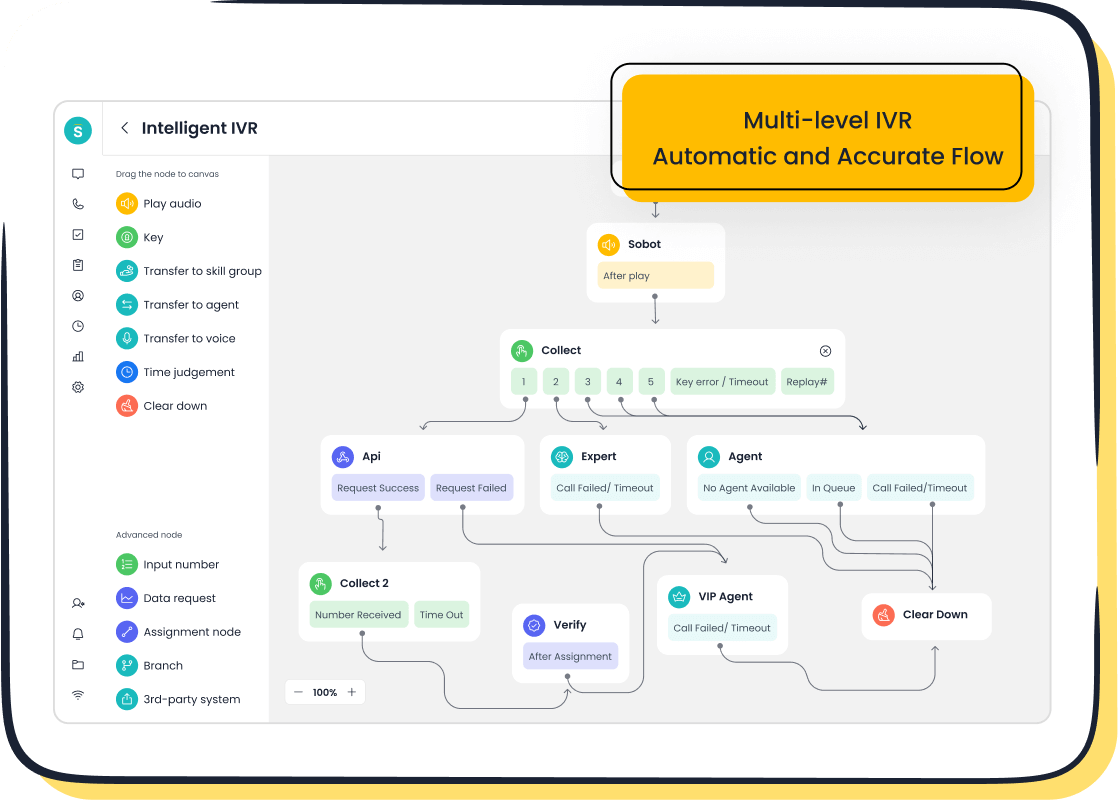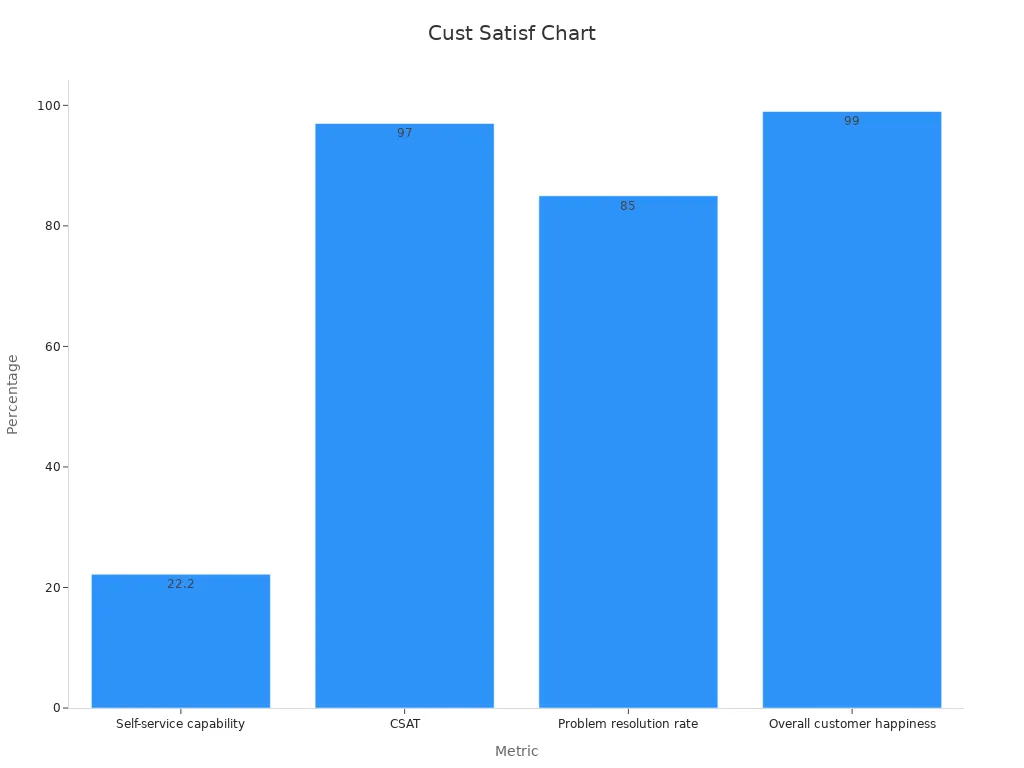Cloud CRM vs On-Premises CRM Systems: A Comprehensive Guide

Customer Relationship Management (CRM) systems are essential tools for businesses to manage customer interactions. Cloud-based CRM operates on remote servers, accessible via the internet, while on-premises CRM resides on local servers. The key difference lies in hosting and accessibility—cloud CRM offers flexibility, while on-premises provides control. Today, 87% of businesses rely on cloud-based CRM, showcasing its dominance. Choosing the right system impacts your customer service and long-term success. Sobot’s cloud customer relationship management solutions ensure scalability, efficiency, and seamless operations, making them ideal for modern businesses.
Understanding Cloud-Based CRM and On-Premises CRM Systems
What Is Cloud Customer Relationship Management?
Cloud customer relationship management refers to CRM systems hosted on remote servers and accessed through the internet. These systems allow you to manage customer interactions without needing physical hardware or software installations. You can access cloud CRM systems from anywhere, making them ideal for businesses with remote teams or global operations.
The market for cloud CRM is growing rapidly. In 2023, it was valued at approximately USD 58.95 billion. By 2033, it is expected to reach USD 143.09 billion, driven by the increasing adoption of cloud technologies and digital transformation across industries. With a projected compound annual growth rate (CAGR) of 9.3% from 2025 to 2033, cloud CRM systems are becoming the preferred choice for businesses seeking scalability and efficiency.
Sobot’s cloud customer relationship management solutions exemplify this trend. They offer features like AI-powered voicebots, intelligent call routing, and global accessibility, ensuring your business stays ahead in customer service and operational efficiency.
What Is On-Premise CRM?
On-premise CRM systems are hosted on your company’s local servers. These systems require physical hardware and software installations, giving you complete control over data storage and system configurations. If your business prioritizes data security and prefers to manage infrastructure internally, on-premise CRM might be a suitable option.
However, on-premise systems often involve higher upfront costs for hardware, software, and IT personnel. They also lack the flexibility of cloud CRM systems, as access is limited to specific devices within your network. For businesses with strict regulatory requirements or those operating in industries where data control is critical, on-premise CRM can provide peace of mind.
Hosting and Infrastructure: Key Differences
The hosting and infrastructure of cloud CRM systems differ significantly from on-premise CRM. Cloud CRM systems rely on remote servers managed by third-party providers. These systems use advanced performance optimization techniques like caching, load balancing, and parallel processing to ensure speed and reliability. They also incorporate redundancies across regions, minimizing downtime and enhancing fault tolerance.
On-premise CRM systems, on the other hand, depend on your internal infrastructure. While they offer control, they often face limitations in scalability and reliability. You must invest in backup solutions, redundancy, and monitoring to maintain system performance.
Cloud CRM systems excel in availability and scalability. They allow you to adapt quickly to changing business needs without worrying about infrastructure constraints. Sobot’s cloud solutions, for example, provide a 99.99% uptime guarantee, ensuring uninterrupted operations for your business.
Tip: When choosing between cloud and on-premise CRM, consider your business’s need for flexibility, control, and scalability. Cloud CRM systems are ideal for businesses seeking global accessibility and seamless integration, while on-premise CRM suits organizations with strict data control requirements.
Cost Comparison: Cloud CRM vs On-Premises CRM
Upfront Costs and Subscription Models
When comparing upfront costs, cloud CRM systems stand out for their affordability. They eliminate the need for expensive hardware and software installations. Instead, you pay a subscription fee, which can be monthly or annual. This flexibility allows you to manage costs effectively. For example, a cloud CRM for a 50-person team might cost $30,000 annually, based on $25 per user per month.
On-premise CRM systems, however, require a significant initial investment. You need to purchase hardware, software, and licenses. For the same 50-person team, the upfront cost could reach $50,000. While this one-time payment might seem cost-effective in the long run, it demands a larger budget at the start.
| Feature | Cloud CRM | On-Premises CRM |
|---|---|---|
| Upfront Costs | Lower installation costs, no hardware needed | Higher initial costs for hardware and software |
| Subscription Fees | Flexible payment options (monthly/quarterly) | One-time purchase, potentially more cost-effective in the long run |
Maintenance and Hidden Costs
Cloud CRM systems reduce your maintenance burden. The provider handles updates, security patches, and technical support. This lowers ongoing costs and ensures smooth operations. However, you may encounter hidden fees for adding users or integrating additional apps.
On-premise solutions place the responsibility for maintenance on your IT team. You must budget for updates, technical support, and system monitoring. These costs can add up over time. Additionally, hidden expenses like data migration, customization, and training can strain your budget.
- Ongoing costs include:
- Subscription fees for cloud CRM systems.
- Maintenance costs for on-premise solutions.
- Additional expenses for updates, training, and app integration.
Long-Term Financial Implications
Cloud CRM systems offer predictable costs. Subscription-based pricing ensures you know what to expect each month. This model aligns with your business needs, especially if you prefer flexibility. However, consistent usage over time might lead to higher cumulative costs compared to on-premise CRM.
On-premise CRM systems require a larger initial investment but lower annual maintenance costs. For instance, maintenance fees range from $10,000 to $15,000 annually. Over time, this can make on-premise solutions more cost-effective for businesses with stable needs.
| CRM Type | Initial Cost | Annual Maintenance Cost | Total First-Year Cost |
|---|---|---|---|
| Cloud | $0 (subscription) | $30,000 (for 50 users) | $30,000 |
| On-Premise | $50,000 | $10,000 - $15,000 | $60,000 - $65,000 |
Tip: Consider your business’s growth and budget when choosing between cloud CRM and on-premise CRM. Cloud CRM systems excel in flexibility, while on-premise solutions may offer long-term savings for stable operations.
Security Considerations for CRM Systems
Data Security in Cloud-Based CRM
Cloud-based CRM systems prioritize data security by implementing advanced measures. Providers often use encryption to protect your data during transmission and storage. They also employ firewalls, intrusion detection systems, and regular security audits to ensure robust protection. These systems are hosted on secure servers, often in multiple locations, to prevent data loss due to hardware failures or cyberattacks.
One of the key advantages of cloud CRM is the automatic updates provided by the vendor. These updates include the latest security patches, ensuring your system stays compliant with evolving data security standards. However, you must choose a reliable provider like Sobot, which guarantees a 99.99% uptime and encrypted data transfer. This ensures your business operations remain secure and uninterrupted.
Data Security in On-Premises CRM
On-premises solutions give you complete control over your data. You store all information on your local servers, which means you can implement your own security protocols. This level of control is ideal if your business operates in an industry with strict data protection regulations.
However, managing data security for on-premises solutions requires significant effort. You need to invest in firewalls, antivirus software, and regular system monitoring. Additionally, your IT team must stay updated on the latest threats and implement necessary patches. While this approach offers control, it demands resources and expertise to maintain a high level of data security.
Compliance and Regulatory Standards
Both cloud and on-premises CRM systems must adhere to data protection laws and industry-specific regulations. For example, businesses in healthcare must comply with HIPAA, while those in finance must follow PCI DSS. Cloud CRM providers often have certifications that demonstrate compliance with these standards, making it easier for you to meet regulatory requirements.
On-premises solutions require you to ensure compliance independently. This involves auditing your systems, documenting processes, and staying updated on regulatory changes. While this gives you control, it also adds to your responsibilities. Choosing a solution like Sobot’s cloud CRM can simplify compliance by offering built-in features that align with global data security standards.
Tip: Always evaluate your industry’s regulatory needs when selecting a CRM system. A secure and compliant system protects your business and builds customer trust.
Scalability and Flexibility of CRM Systems

Scaling with Cloud CRM Solutions
Cloud CRM systems are designed to grow with your business. They offer unmatched scalability, allowing you to add users, features, or storage as your needs evolve. This flexibility ensures that your CRM system can handle increased customer interactions without compromising performance. For instance, Sobot’s cloud solutions provide a 99.99% uptime guarantee, ensuring uninterrupted service even during peak usage.
Businesses that adopt cloud CRM often experience faster growth. A case study of Salesforce CRM implementations highlights this. Companies faced challenges like the need for speed, collaboration, and scalability. By adopting cloud CRM, they achieved enhanced customer satisfaction, improved efficiency, and reduced resolution times.
| Challenges | Solutions | Results |
|---|---|---|
| Need for Speed and Efficiency | Adopted Salesforce CRM | Enhanced Customer Satisfaction |
| Collaboration and Connectivity | Customized Salesforce | Improved Efficiency |
| Scalability and Mobility | Comprehensive training provided | Reduced time to resolve customer issues |
Cloud CRM systems also support global operations. They enable businesses to localize content and personalize customer experiences, leading to higher retention rates and broader market reach. This makes cloud CRM an ideal choice for companies seeking scalable plans to support their growth.
Scaling with On-Premises CRM Systems
On-premises CRM systems offer scalability, but with limitations. Expanding these systems requires significant investments in hardware, software, and IT resources. For example, the maximum number of rows in a single on-premises CRM table is typically capped at 200 million, while simultaneous user access is limited to around 1,050 users. These constraints can hinder your ability to scale efficiently.
| Factor | Recommended upper limit |
|---|---|
| Maximum number of rows in a single table | 200 million |
| Maximum number of rows in a single workspace | 500 million |
| Maximum number of users accessing the application simultaneously | 1,050 |
While on-premises systems provide control, they lack the agility of cloud CRM. Scaling often involves downtime and higher costs, making them less suitable for businesses with dynamic growth needs.
Flexibility for Growing Businesses
Flexibility is crucial for businesses in growth phases. Cloud CRM systems excel in this area by offering adaptable features and user-friendly interfaces. For example, HubSpot’s flexible licensing model and shorter implementation times make it a popular choice for growing companies. In contrast, traditional CRMs like Salesforce often involve higher costs and longer deployment periods.
| Flexibility Metric | HubSpot | Traditional CRMs (e.g., Salesforce) |
|---|---|---|
| Licensing Model | Flexible licensing model | Per-user license model |
| Total Cost of Ownership | Lower total cost of ownership | Higher total cost |
| Implementation Time | Shorter implementation time | Longer implementation time |
| User Experience | User-friendly design | More complex systems |
| Adaptability | High adaptability to business needs | Limited adaptability |
Sobot’s cloud CRM solutions stand out by combining scalability with flexibility. They allow you to adjust features and integrate seamlessly with existing systems, ensuring your CRM evolves alongside your business. Whether you’re a startup or an enterprise, these solutions provide the tools you need to thrive in a competitive market.
Tip: Choose a CRM system that aligns with your growth strategy. Cloud CRM systems offer scalable plans and unmatched flexibility, making them ideal for businesses aiming to expand rapidly.
Accessibility and Deployment Ease

Remote Access with Cloud-Based CRM
Cloud-based CRM software offers unmatched remote access, enabling you to manage customer interactions from any device with internet connectivity. This flexibility is essential for modern businesses, especially those with remote teams or global operations. Unlike on-premises systems, cloud CRM eliminates hardware dependencies, making it easier to adapt to today’s dynamic work environments.
For example:
- You can access cloud CRM software from your laptop, tablet, or smartphone, ensuring uninterrupted workflows.
- Teams working across different time zones can collaborate seamlessly, improving productivity and customer service.
Sobot’s cloud-based software exemplifies this accessibility. Its 99.99% uptime ensures your team can stay connected, no matter where they are. This level of reliability makes cloud CRM an ideal choice for businesses prioritizing operational efficiency and customer satisfaction.
Deployment Time for On-Premises CRM
On-premises CRM systems require significant time for deployment. You need to install hardware, configure software, and train your team. This process can take weeks or even months, depending on your business size and IT infrastructure.
In contrast, cloud CRM systems offer faster deployment. Providers handle the setup, allowing you to start using the system within days. This quick turnaround minimizes downtime and helps you focus on your core business activities.
For businesses with limited IT resources, the lengthy deployment of on-premises systems can be a challenge. Cloud CRM solutions, like those offered by Sobot, simplify this process. They provide ready-to-use platforms that integrate seamlessly with your existing tools, saving you time and effort.

How Sobot’s Voice/Call Center Enhances Accessibility
Sobot’s Voice/Call Center takes accessibility to the next level. It provides a unified workspace where agents can manage calls and customer data efficiently. Features like intelligent IVR and AI-powered voicebots ensure customers receive quick and accurate responses.
The impact of these features is evident in customer satisfaction metrics:
| Metric | Value |
|---|---|
| Self-service capability | 22.2% |
| Customer Satisfaction Score (CSAT) | 97% |
| Problem resolution rate | 85% |
| Overall customer happiness | 99% |

Sobot’s system also supports global telephony, ensuring your team can connect with customers worldwide. With mobile compatibility and encrypted data transfer, it offers a secure and flexible solution for businesses of all sizes.
Tip: Choose a CRM system that aligns with your team’s accessibility needs. Cloud CRM solutions like Sobot’s ensure seamless operations, even in remote or hybrid work environments.
Choosing the Right CRM System for Your Business
Small Business Considerations
As a small business owner, you need a customer relationship management system that aligns with your limited resources and growing needs. Cloud-based CRM systems are particularly advantageous for small businesses due to their affordability and ease of use. These systems eliminate the need for costly hardware and IT infrastructure, allowing you to focus on your core operations.
One of the key considerations for small businesses is improving customer relationships. A cloud CRM system centralizes customer data, making it easier to organize and follow up with clients. Automation features streamline your sales processes, reducing the time spent on administrative tasks. Additionally, cloud storage minimizes operational costs by eliminating the need for local databases.
| Benefit | Description |
|---|---|
| Improved customer relationships | Centralized storage of customer data enhances organization and follow-up capabilities. |
| Streamlined sales processes | Automation reduces time spent on administrative tasks, allowing focus on closing deals. |
| Reduced operational costs | Cloud storage minimizes local database expenses and increases efficiency in accessing customer data. |
Sobot’s cloud CRM solutions are ideal for small businesses. They offer features like AI-powered chatbots and intelligent call routing, which enhance efficiency and customer satisfaction. With a software-as-a-service model, you can scale your operations without worrying about infrastructure constraints.
Tip: Choose a CRM system that grows with your business. Cloud-based solutions like Sobot’s provide the flexibility and cost-effectiveness you need to succeed.
Enterprise-Level Needs
For enterprises, the choice between cloud and on-premises CRM systems depends on scalability, security, and operational demands. Historically, on-premises CRM dominated the market, accounting for 88% of all solutions in 2008. Today, cloud CRM systems represent 87% of all CRM solutions, reflecting their growing popularity among large organizations.
Cloud CRM systems excel in scalability, allowing you to expand without investing in additional hardware. This flexibility helps enterprises adapt to market demands and manage operational costs effectively. In fact, cloud CRMs now account for 80% of CRM sales due to their ability to support growing organizations.
- Cloud CRMs make up 80% of CRM sales due to their scalability and flexibility for growing organizations.
- Cloud CRMs excel in scalability, allowing businesses to expand without additional hardware investments.
- This flexibility helps organizations adapt to market demands and manage operational costs.
Sobot’s software-as-a-service solutions cater to enterprise-level needs by offering global accessibility, seamless integration, and advanced analytics. For example, the Sobot Voice/Call Center provides intelligent IVR and AI-powered voicebots, ensuring efficient customer interactions. With a 99.99% uptime guarantee, Sobot ensures uninterrupted operations for your business.
Note: Enterprises should evaluate their scalability and security requirements when choosing a CRM system. Cloud solutions like Sobot’s offer unmatched flexibility and reliability.
Industry-Specific Applications of Sobot’s Cloud CRM
Different industries have unique requirements for customer relationship management. Sobot’s cloud CRM solutions are designed to meet these diverse needs, offering tailored features for various sectors.
In retail and e-commerce, Sobot’s omnichannel solution enables you to manage customer interactions across platforms like social media, email, and live chat. This unified approach improves customer satisfaction and loyalty. For financial services, Sobot’s secure and compliant systems ensure data protection while streamlining complex customer inquiries.
The gaming industry benefits from Sobot’s AI-driven insights, which help support teams resolve player issues efficiently. In education, Sobot’s CRM system provides a comprehensive view of customer interactions, enabling agents to address inquiries effectively. These industry-specific applications demonstrate the versatility of Sobot’s cloud CRM solutions.
For example, Opay, a leading financial service platform, implemented Sobot’s omnichannel solution to enhance customer service and marketing. This integration resulted in a 90% customer satisfaction rate, a 20% reduction in operational costs, and a 17% increase in conversion rates.
Tip: Consider your industry’s specific needs when selecting a CRM system. Sobot’s cloud CRM solutions offer tailored features to help you achieve your business goals.
Choosing between cloud-based and on-premises CRM systems depends on your business needs. Cloud CRM offers flexibility, scalability, and remote access, while on-premises CRM provides control and security. For example, cloud CRM systems like Sobot’s ensure 99.99% uptime and global accessibility, making them ideal for businesses aiming to grow quickly.
Aligning your CRM choice with your goals is essential. If you prioritize efficiency and customer satisfaction, Sobot’s solutions deliver advanced features like AI-powered voicebots and omnichannel integration. These tools help you streamline operations and improve customer interactions.
Tip: Explore Sobot’s scalable and efficient CRM solutions to enhance your customer service. Visit Sobot’s website to learn more.
FAQ
1. What is the main difference between cloud CRM and on-premises CRM?
Cloud CRM operates on remote servers, accessible via the internet. On-premises CRM resides on local servers, requiring physical hardware. Cloud CRM offers flexibility and scalability, while on-premises CRM provides control and security. Your choice depends on your business needs and priorities.
2. How secure are cloud CRM systems?
Cloud CRM systems use encryption, firewalls, and regular security updates to protect your data. Providers like Sobot ensure compliance with global standards and offer features like encrypted data transfer. Choosing a reliable provider guarantees robust security for your business operations.
3. Can small businesses benefit from cloud CRM systems?
Yes, cloud CRM systems are ideal for small businesses. They reduce costs by eliminating hardware needs and streamline operations with automation. Sobot’s solutions offer scalability and user-friendly features, helping you manage customer relationships efficiently as your business grows.
4. How does Sobot’s Voice/Call Center improve customer service?
Sobot’s Voice/Call Center enhances customer service with intelligent IVR, AI-powered voicebots, and global telephony support. These features ensure quick responses, efficient call routing, and seamless communication. Your team can manage calls and customer data effectively, boosting satisfaction rates.
5. What industries benefit most from Sobot’s cloud CRM solutions?
Sobot’s cloud CRM solutions cater to retail, financial services, gaming, education, and more. For example, Opay improved customer satisfaction by 90% and reduced costs by 20% using Sobot’s omnichannel platform. Tailored features meet the unique needs of various industries.
See Also
Comprehensive Overview of Omnichannel Call Center Solutions
Best Reviewed Cloud Contact Center Services for 2024
Best Free CRM Software for Call Centers in 2024
